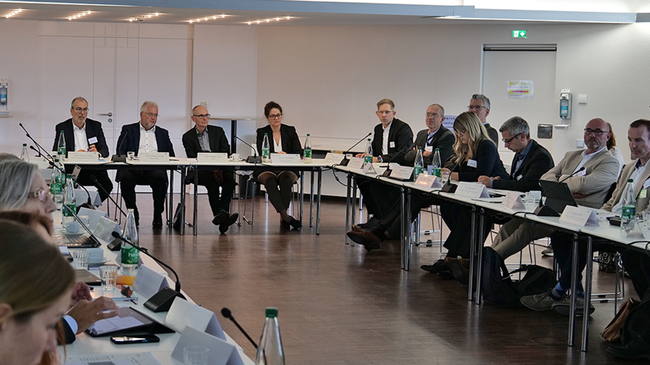2025 Annual Meeting between the Paul-Ehrlich-Institut and the Federal Institute for Drugs and Medical Devices with the Association of Research-Based Pharmaceutical Companies (vfa)
On 3 September 2025, experts from the Paul-Ehrlich-Institut (PEI), the Federal Institute for Vaccines and Biomedicines, and the Federal Institute for Drugs and Medical Devices (Bundesinstitut für Arzneimittel und Medizinprodukte, BfArM) met with representatives and corporate members of the Association of Research-Based Pharmaceutical Manufacturers (Verband forschender Arzneimittelhersteller, vfa) for their annual exchange. Topics on the agenda included the Medical Research Act (Medizinforschungsgesetz, MFG), clinical trials, medicinal product safety and authorisation, digitalisation, and artificial intelligence.
 Source: Paul-Ehrlich-Institut
Source: Paul-Ehrlich-Institut
The President of the Paul-Ehrlich-Institut, Professor Stefan Vieths, and the Vice President of the BfArM, Professor Werner Knöss, kicked off the discussion between regulatory experts by giving an overview of the current structure of the two higher federal authorities. The overview included a presentation of the central coordination office and the Specialised Ethics Committee, which were set up within the framework of the Medical Research Act (MFG). The goal of the coordination office is to use harmonised processes to optimise cooperation between the two higher federal authorities in the areas of scientific advice, medicinal product authorisation procedures, and approval of clinical trials. The Specialised Ethics Committee for Special Procedures is another central element of the MFG with the aim of strengthening the research and development of medicinal products in Germany. The committee examines ethical aspects of certain clinical trials, such as clinical trials for advanced therapy medicinal products (ATMPs).
The two higher federal authorities gave the representatives and the corporate members of the vfa an overview of their current regulatory performance in centralised authorisation procedures, scientific advice, and the approval of clinical trials. In the area of centralised European procedures, the two German regulatory authorities have taken over more rapporteurships and co-rapporteurships in the current year than other European countries. Germany will take on the highest number of clinical trial approval procedures as a reporting Member State in 2025.
Other topics of exchange were the current status of the Data Access and Coordination Office (DACO), which was established at the BfArM in November 2024, and preparations for the implementation of the new EU Regulation for substances of human origin (SoHO) at the Paul-Ehrlich-Institut. The experts also discussed the current state and applicability of artificial intelligence (AI), digitalisation, and ongoing IT projects at the two institutes. The publication of commissioned training materials on active substances and medicinal products and joint scientific consultation within the framework of the Health Technology Assessment (HTA) regulation, which has been in force since 12 January 2025, were also on the agenda.
Annual Exchange as a Basis for Continuous Knowledge Sharing
The annual meeting with the vfa is an established dialogue platform that was held for the first time this year as a joint meeting with both higher federal authorities. The constructive, intensive exchange of experience and information once again proved how important continuous knowledge transfer between the regulatory authorities and the pharmaceutical industry is for the quality, effectiveness, safety, and availability of medicinal products in Germany and Europe.



